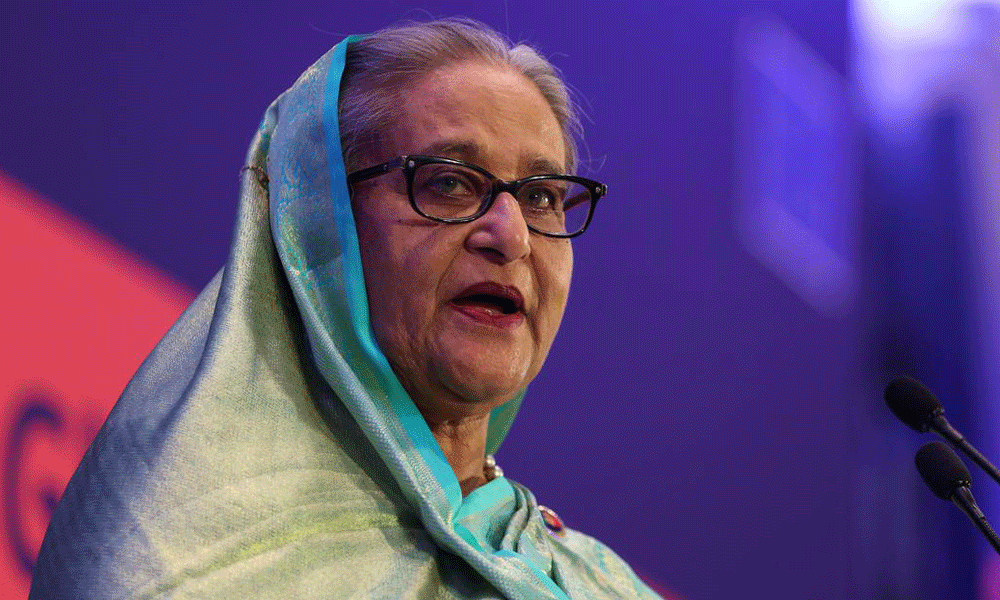
Photo : Collected
International relations experts, former diplomats, and political scientists observe little scope of Sheikh Hasina’s repatriation due to India’s opportunity to explore legal loopholes and lack of political will, though Bangladesh on Monday formally sent a note verbale to the neighbouring country requesting her extradition.
Bangladesh’s foreign ministry spokesperson Rafiqul Alam said Dhaka has not yet received any response from Delhi regarding the extradition of ousted prime minister who has been residing there since she fled the country.
“So far, we haven’t received any reply from New Delhi in official channel. We will wait for their response, and if no reply comes within a certain period, we will send a reminder letter,” he told reporters during a briefing of the ministry on Tuesday.
Experts, however, said apart from continue exerting pressure on the issue, Dhaka can request Delhi to ask Hasina to not get involved in activities which can destabilise Bangladesh, recognise July uprising on a positive note and change its overall policy towards Bangladesh.
“It is clear to us that India will not extradite Sheikh Hasina. Yet Bangladesh can push the issue to them. And we need to understand that Bangladesh-India relations should not be centered on the ousted prime minister. There are still many issues where we can focus,” Professor Shahab Enam Khan of the Department of International Relations at Jahangirnagar University told the Daily Sun.
He said if anyone from this part of the border tells anything about India, the country reacts. It should understand that similarly if anyone comes up with similar opinion about Bangladesh in their territory, it hurts us, he added.
“India can examine that whether its visa policy allows Sheikh Hasina to deliver audio speeches full of issues affect Bangladesh’s stability. Besides, it should change its policy towards Bangladesh,” said Shahab, who also serves as executive director and CEO of the Bangladesh Centre for Indo-Pacific Affairs.
Former ambassador Humayun Kabir said there are two sides of Sheikh Hasina’s extradition as he thinks that India will prefer political factors of the issue than the legal aspects though the Article 6 of the 2013 extradition treaty between the two countries offers it the opportunity to explore legal loopholes.
He said, “Prof Muhammad Yunus in an interview with an international media said that Bangladesh will request for Sheikh Hasina’s extradition once the trial proceedings reach a certain stage. But his government sent a letter in this regard due to court’s directive.”
Kabir, also the president of the Bangladesh Enterprise Institute, said now it’s India’s time to respond.
“If Bangladesh even accepts the fact of Sheikh Hasina’s stay in India, it will surely express its displeasure if she continues to make political statements residing there,” he added.
Prof Sabbir Ahmed of the political science department at Dhaka University also thinks that political consideration will be a key factor in addressing the issue of Sheikh Hasina’s extradition from India.
“India has a historic relationship with Sheikh Hasina and Awami League. It has offered shelter to numerous fleeing Awami League leaders there along with Sheikh Hasina. I think this can be a bargaining tool for the country with Bangladesh if it can keep its influence on them. India has no reasons to leave this opportunity,” he told the Daily Sun.
“India realises that it would be difficult for Bangladesh to ignore its influential neighbour due to its geographic location,” Prof Sabbir, who is also the general secretary of Bangladesh Political Science Network, said, adding that India can now focus more on developing relations with the people of Bangladesh instead of any particular leader or party while for Bangladesh the issue of preference should be continue economic ties with India keeping politics aside.
Since Sheikh Hasina fled to India on 5 August in the face of a student-led mass uprising, numerous complaints of “genocide and crimes against humanity” have been filed against her, covering the period between 15 July and 5 August and the 15-and-a-half-year tenure of the Awami League’s authoritarian rule.
The International Crimes Tribunal (ICT), reconstituted under the leadership of Justice Md Golam Mortuza Majumdar, issued an arrest warrant for Hasina on 17 October in one case and warrants for 45 others, including members of her family and senior Awami League leaders, in another.
On 17 December, the tribunal granted investigators until 18 February to submit a report against Sheikh Hasina.
Since the ICT’s reconstitution, over 300 complaints have been filed in the past three-and-a-half months, involving allegations such as murder, genocide, enforced disappearances, attempted murder, torture, and the Pilkhana tragedy.
Of these, 168 complaints were referred to the tribunal’s investigative body, including 44 specific to enforced disappearances attributed to Sheikh Hasina.
On 12 November, the ICT chief prosecutor’s office sent a letter to the Interpol, requesting it to issue a Red Alert against Hasina to ensure her arrest and repatriation.

